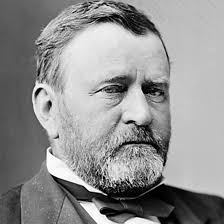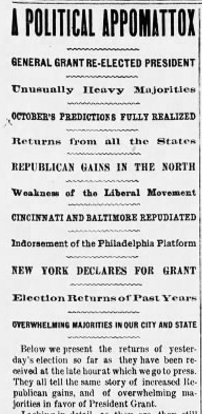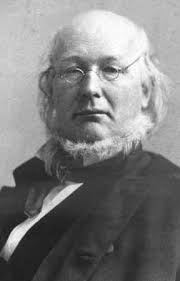| Whatever may be said of the dismal choices voters face in this year’s presidential election, at least nobody’s running mate got so drunk at a campaign event that he tried to butter a watermelon. That happened in 1872, which could be a good answer to the question, when have you ever seen such a dismal choice for the White House? Maybe you could argue things weren’t as bad back then. At least, neither candidate was accused of |
| | groping a woman, and email hadn’t yet been invented. But the candidates were hardly stellar. Benjamin Brown, the governor of Missouri, was the candidate who got so plastered at an event he didn’t know which side of a slice of watermelon to butter. He was the running mate of Horace Greeley, a renowned newspaper editor who spent much of his life writing editorials telling candidates what to do but had no real political experience and, apparently, an inability to deliver a speech anyone cared to hear. But Greeley was the candidate only because the incumbent, President Ulysses S. Grant, had such a corrupt administration a lot of Republicans refused to support him. They formed their own Liberal Republican Party and nominated the Greeley-Brown ticket. The Democrats, still reeling from that whole Civil War thing, couldn’t get their act together. They ended up endorsing the Greeley-Brown ticket, as well. That would be kind of like today’s Republican Party deciding to nominate Bernie Sanders. Greeley did something unheard of for the time – he actually went on the stump and campaigned. But he was a horrible speaker. As blogger Sean Munger puts it, “Grant, for his part, sat back comfortably in the White House, smoked cigars and let the newspapers play up memories of all the battles he’d won during the Civil War.” Horace Greeley In other words, he ignored the concerns about corruption. He also got a lot of big campaign contributions from the business titans of his day. You could get away with that in 1872 if you had been a war hero. Meanwhile, as potus-geeks.livejournal.com says of Greeley, “his career as a newspaper editor gave his opponents a long history of public positions to attack.” That year’s October surprise was the death of Greeley’s wife, who succumbed to a long illness. A few days later, Grant won the election by a 286-66 electoral vote margin. Greeley, devastated either by the election or his wife’s death, or both, checked into a hospital and died Nov. 29. Because his death came before the electors officially cast their ballots, his 66 votes ended up scattered among several other candidates. Brown even got a few, to which he probably hoisted a few toasts. It didn’t matter, because Grant had more than enough to win, but it set a rather shaky precedent for what to do if a major candidate dies right after the election. The nation hasn’t faced a situation like that since. The New York Times reported that the owner of the Glenham Hotel in Manhattan was glad to see the Liberal Republicans lose. The party’s national committee used the hotel as its headquarters but had been behind in the rent, and its members were, generally, a “rum lot,” he said. Clearly, the nation was a different place in 1872, but America during reconstruction had its share of problems. Americans no doubt wondered how they could have gone from Lincoln to the choices they had in so few years. |




 RSS Feed
RSS Feed

